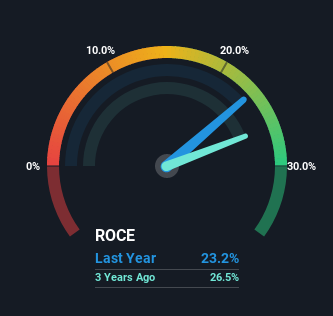- Hong Kong
- /
- Consumer Durables
- /
- SEHK:2127
Capital Allocation Trends At Huisen Household International Group (HKG:2127) Aren't Ideal

There are a few key trends to look for if we want to identify the next multi-bagger. One common approach is to try and find a company with returns on capital employed (ROCE) that are increasing, in conjunction with a growing amount of capital employed. Basically this means that a company has profitable initiatives that it can continue to reinvest in, which is a trait of a compounding machine. So when we looked at Huisen Household International Group (HKG:2127), they do have a high ROCE, but we weren't exactly elated from how returns are trending.
Understanding Return On Capital Employed (ROCE)
For those who don't know, ROCE is a measure of a company's yearly pre-tax profit (its return), relative to the capital employed in the business. Analysts use this formula to calculate it for Huisen Household International Group:
Return on Capital Employed = Earnings Before Interest and Tax (EBIT) ÷ (Total Assets - Current Liabilities)
0.23 = CN¥1.1b ÷ (CN¥5.7b - CN¥851m) (Based on the trailing twelve months to December 2021).
Thus, Huisen Household International Group has an ROCE of 23%. In absolute terms that's a great return and it's even better than the Consumer Durables industry average of 13%.
Check out our latest analysis for Huisen Household International Group

While the past is not representative of the future, it can be helpful to know how a company has performed historically, which is why we have this chart above. If you'd like to look at how Huisen Household International Group has performed in the past in other metrics, you can view this free graph of past earnings, revenue and cash flow.
What Does the ROCE Trend For Huisen Household International Group Tell Us?
On the surface, the trend of ROCE at Huisen Household International Group doesn't inspire confidence. To be more specific, while the ROCE is still high, it's fallen from 30% where it was four years ago. However, given capital employed and revenue have both increased it appears that the business is currently pursuing growth, at the consequence of short term returns. If these investments prove successful, this can bode very well for long term stock performance.
On a side note, Huisen Household International Group has done well to pay down its current liabilities to 15% of total assets. That could partly explain why the ROCE has dropped. Effectively this means their suppliers or short-term creditors are funding less of the business, which reduces some elements of risk. Since the business is basically funding more of its operations with it's own money, you could argue this has made the business less efficient at generating ROCE.
The Bottom Line On Huisen Household International Group's ROCE
Even though returns on capital have fallen in the short term, we find it promising that revenue and capital employed have both increased for Huisen Household International Group. And there could be an opportunity here if other metrics look good too, because the stock has declined 66% in the last year. As a result, we'd recommend researching this stock further to uncover what other fundamentals of the business can show us.
Huisen Household International Group does have some risks though, and we've spotted 1 warning sign for Huisen Household International Group that you might be interested in.
If you'd like to see other companies earning high returns, check out our free list of companies earning high returns with solid balance sheets here.
If you're looking to trade Huisen Shares Group, open an account with the lowest-cost platform trusted by professionals, Interactive Brokers.
With clients in over 200 countries and territories, and access to 160 markets, IBKR lets you trade stocks, options, futures, forex, bonds and funds from a single integrated account.
Enjoy no hidden fees, no account minimums, and FX conversion rates as low as 0.03%, far better than what most brokers offer.
Sponsored ContentValuation is complex, but we're here to simplify it.
Discover if Huisen Shares Group might be undervalued or overvalued with our detailed analysis, featuring fair value estimates, potential risks, dividends, insider trades, and its financial condition.
Access Free AnalysisHave feedback on this article? Concerned about the content? Get in touch with us directly. Alternatively, email editorial-team (at) simplywallst.com.
This article by Simply Wall St is general in nature. We provide commentary based on historical data and analyst forecasts only using an unbiased methodology and our articles are not intended to be financial advice. It does not constitute a recommendation to buy or sell any stock, and does not take account of your objectives, or your financial situation. We aim to bring you long-term focused analysis driven by fundamental data. Note that our analysis may not factor in the latest price-sensitive company announcements or qualitative material. Simply Wall St has no position in any stocks mentioned.
About SEHK:2127
Huisen Shares Group
Designs, manufactures, develops, and sells furniture products in the United States, the People’s Republic of China, Singapore, Malaysia, Vietnam, Canada, and internationally.
Adequate balance sheet low.
Market Insights
Community Narratives




